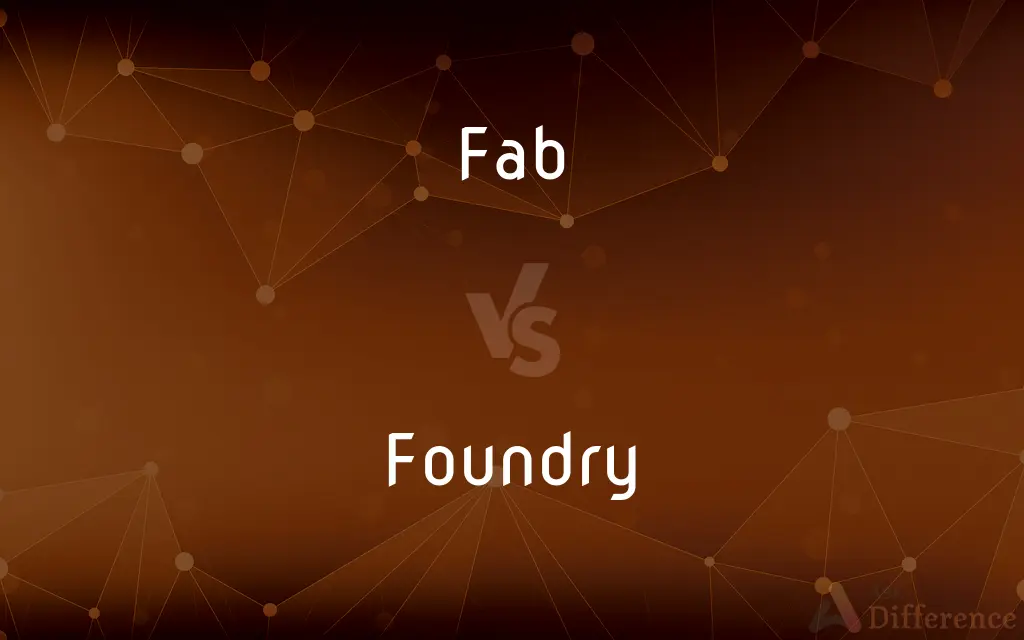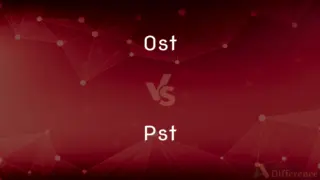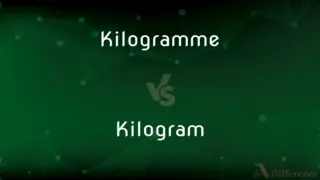Fab vs. Foundry — What's the Difference?
By Tayyaba Rehman & Fiza Rafique — Updated on April 26, 2024
A fab, or fabrication plant, is a facility for manufacturing semiconductor devices, whereas a foundry typically refers to a service that manufactures chips for other companies.

Difference Between Fab and Foundry
Table of Contents
ADVERTISEMENT
Key Differences
A fab, short for fabrication plant, is a highly specialized facility designed to manufacture integrated circuits and other semiconductor devices. On the other hand, a foundry, in the context of semiconductor manufacturing, is a type of fab that produces chips on behalf of other companies, which do not have their own manufacturing capabilities.
Fabs are typically owned and operated by companies that design and manufacture their own products, such as Intel and Samsung. Whereas foundries like TSMC and GlobalFoundries provide manufacturing services to fabless companies, which focus on chip design and leave the production to these third-party factories.
The investment in a fab is substantial, often running into billions of dollars due to the complex, clean room environments and sophisticated equipment required. On the other hand, foundries amortize their investment across multiple clients, potentially reducing the cost per chip for these clients due to economies of scale.
Fabs are equipped to handle the entire production process of semiconductors, from wafer fabrication to assembly and testing. In contrast, foundries might specialize in certain processes and offer varying levels of integration services based on client needs.
Fabs often drive technological innovation by developing new manufacturing technologies to stay competitive. Meanwhile, foundries must balance innovation with the diverse needs of their clients, focusing on flexibility and rapid scalability.
ADVERTISEMENT
Comparison Chart
Definition
Facility for manufacturing semiconductor devices owned by a single company.
Facility manufacturing chips for multiple client companies.
Ownership
Owned by companies that design and produce their own chips.
Operates independently, serving multiple clients.
Investment
High investment in specialized infrastructure.
Costs shared across various clients, leading to economies of scale.
Production Scope
Handles entire production process from design to testing.
May specialize in certain stages of production.
Primary Clients
Self, for in-house product lines.
Fabless semiconductor companies.
Compare with Definitions
Fab
Operates primarily for in-house manufacturing needs.
Our fab is dedicated to producing proprietary chips for our latest devices.
Foundry
Provides production services to fabless companies without their own fabs.
As a fabless startup, partnering with a reliable foundry is essential for our success.
Fab
Aims to innovate in semiconductor production technology.
The fab developed a groundbreaking technique for reducing waste during the chip etching process.
Foundry
Adapts quickly to varying client demands and technology changes.
The foundry upgraded its equipment to support the latest semiconductor technologies demanded by clients.
Fab
A facility equipped to manufacture integrated circuits and semiconductors.
The new fab will increase our capacity to produce advanced microchips.
Foundry
Benefits from economies of scale by serving multiple clients.
The foundry offers competitive pricing due to its large scale operations.
Fab
Involves high investment for state-of-the-art clean room environments.
Building the fab required an investment of over two billion dollars.
Foundry
May not be involved in the design process, focusing on manufacturing.
The foundry excels in manufacturing efficiency but does not partake in design decisions.
Fab
Focuses on complete control over production quality and output.
Our fab maintains stringent quality controls to ensure top-tier chip performance.
Foundry
A type of fab that manufactures chips for external companies.
We contracted a foundry to handle production, allowing us to focus on chip design.
Fab
Fabulous; wonderful
I admired the fab photography
Foundry
A foundry is a factory that produces metal castings. Metals are cast into shapes by melting them into a liquid, pouring the metal into a mold, and removing the mold material after the metal has solidified as it cools.
Fab
A microchip manufacturing plant
The process will reduce the environmental damage caused by chip fabs
Foundry
An establishment where metal objects are made by melting metal and pouring it into molds.
Fab
Produce (a microchip).
Foundry
The skill or operation of founding.
Fab
Fabrication
Building a shed of metal fab.
Foundry
The castings made by founding.
Fab
Fabulous; wonderful.
Foundry
A facility that melts metals in special furnaces and pours the molten metal into molds to make products. Foundries are usually specified according to the type of metal dealt with: iron foundry, brass foundry, etc.
Fab
(informal) fabulous (great or spectacular).
Foundry
The act, process, or art of casting metals; founding.
Fab
A manufacturing plant which fabricates items, particularly silicon chips.
The chip fab will double its production next year.
Foundry
A plant that produces chips out of semiconductors in the microelectronics industry.
Fab
To fabricate, especially in the context of fabbers
It uses digital data from a computer to “fab” products and models of new products. [http://www.ennex.com/~fabbers/publish/FAB-ulous.asp]
Foundry
The act, process, or art of casting metals.
Fab
Extremely pleasing.
Foundry
The buildings and works for casting metals.
Fab
Extremely pleasing;
A fabulous vacation
Foundry
Factory where metal castings are produced
Common Curiosities
What is the primary function of a fab?
The primary function of a fab is to manufacture semiconductor devices for the company that owns it.
What are the advantages of using a foundry instead of building your own fab?
Using a foundry can significantly reduce capital expenditure and allow companies to leverage the foundry's expertise in mass production and technology.
How does a foundry differ from a traditional manufacturing facility?
Unlike traditional manufacturing facilities, a foundry specifically produces semiconductor chips on behalf of other companies, usually those without their own manufacturing capabilities.
Can a fab also act as a foundry?
Yes, some fabs like Samsung do both, manufacturing their own products and offering excess manufacturing capacity to other companies.
How do fabs and foundries contribute to technological advancements?
Fabs often develop proprietary manufacturing technologies that advance the overall field, while foundries must quickly adapt to and implement broad technological trends to meet client demands.
What industries rely on fabs and foundries?
Industries such as consumer electronics, computing, automotive, and telecommunications rely heavily on fabs and foundries for their semiconductor needs.
What is the role of a fab in product development?
A fab plays a critical role in product development by closely integrating design and manufacturing to streamline the production of semiconductor devices.
What is the investment difference between a fab and a foundry?
A fab requires a higher initial investment focused on a single company's needs, while a foundry's costs are distributed among various clients, potentially lowering the cost per unit.
What economies of scale can be achieved in a foundry?
Foundries achieve economies of scale by manufacturing large volumes of products for multiple clients, reducing the cost per unit through efficient use of resources and technology.
Why might a company choose to outsource to a foundry?
Outsourcing to a foundry allows companies to avoid the high costs of fab infrastructure and focus on design and innovation without the complexities of manufacturing.
Can the production quality differ between a fab and a foundry?
Production quality can vary; fabs might have tighter control over quality for their specific products, while foundries must meet a broad range of quality standards for various clients.
What strategic advantages do fabs offer to companies with high product demand?
For companies with high product demand, owning a fab ensures a steady supply of components, critical for maintaining market position and meeting consumer expectations.
What is the impact of a foundry's technological flexibility on its clients?
A foundry's technological flexibility can greatly benefit its clients by enabling them to adopt the latest technologies without personal investment in new equipment.
How does the business model of a foundry support small and startup companies?
Foundries support small and startup companies by providing access to high-quality manufacturing processes without the need for heavy capital investment.
How do fabs and foundries manage environmental and regulatory challenges?
Both fabs and foundries must adhere to stringent environmental regulations and adopt sustainable practices to minimize the impact of their operations on the environment.
Share Your Discovery

Previous Comparison
OST vs. PST
Next Comparison
Kilogramme vs. KilogramAuthor Spotlight
Written by
Tayyaba RehmanTayyaba Rehman is a distinguished writer, currently serving as a primary contributor to askdifference.com. As a researcher in semantics and etymology, Tayyaba's passion for the complexity of languages and their distinctions has found a perfect home on the platform. Tayyaba delves into the intricacies of language, distinguishing between commonly confused words and phrases, thereby providing clarity for readers worldwide.
Co-written by
Fiza RafiqueFiza Rafique is a skilled content writer at AskDifference.com, where she meticulously refines and enhances written pieces. Drawing from her vast editorial expertise, Fiza ensures clarity, accuracy, and precision in every article. Passionate about language, she continually seeks to elevate the quality of content for readers worldwide.













































